- Home
- Richard Flanagan
The Narrow Road to the Deep North Page 22
The Narrow Road to the Deep North Read online
Page 22
Colonel Kota spread his legs, got his balance, with a scream raised the sword high into the air, and went to recite Kikusha-ni’s haiku one last time. But he could not remember the correct sequence of the middle syllables. In his mind, he kept muddling the poem.
All waited—Colonel Kota with the sword poised above the kneeling POW, the Goanna holding a cigarette next to his lips, Gallipoli von Kessler watching transfixed. Alone unable to see, Darky Gardiner knew only the wet heat like a blanket and the sweat on his closed eyes. All he could feel with his wretched rag of a body, twisted with terror, was the sword poised between him and the sun.
He didn’t dare gulp.
He could smell Colonel Kota, an overwhelming odour of rotting fish. He could feel the sword blade hunger in the air above. He could hear blood. His. Theirs. Growing louder.
And Colonel Kota, a man who believed in symmetry and order in all things, grew confused as his mind railed against its own weakness. He was bewildered. He had lost control of the sequence of things—and in losing that, he had lost control of this ending and, in some strange way that was to him also perfectly logical, of his own life. And that he could not allow.
Darky Gardiner’s neck seemed to him to be screaming. He longed for the blow of the sword so that it might be over. He wondered if the sword was already falling, if his head were already—
He’s gone, he heard Kes say.
There were sounds of someone walking away, a short silence, and the same footsteps coming back.
He’s fucked off, Kes said. I’ve checked. You can look, Darky.
And Darky Gardiner opened his eyes.
Kota and his sword had disappeared. The Goanna was gone. Only Kes remained, apple-pip eyes staring down at him. Darky looked around at the black line of the bamboos at the top of a nearby cliff and, beyond, the silhouette of teak.
Jeepers creepers, Kes said, look at those peepers.
He heard the screech of monkeys.
He smelt the reeking mud of the jungle.
And in all this life around him, Darky Gardiner for the first time sensed his own death. He understood that all this would go on, and of him nothing would remain, that even his memory, though held by a few family and friends for a few years, perhaps decades, would ultimately be forgotten and mean no more than a fallen bamboo, than the inescapable mud. As Darky Gardiner looked up and down the track, as he thought of the naked slaves only a mile distant toiling away, he felt the most terrible rage seize him. All this would go on and on, and only he would be gone. Everywhere he looked, he could see the most vibrant world of life that had no need of him, that would not think for a moment of his vanishing, and it would have no memory of him. The world would go on without him.
You all right, mate? Kes asked.
Darky Gardiner’s eyes were darting everywhere, and everywhere all he could see was a world to which he was meaningless, nothing, that had no need of him. They would toss him on a fire of bamboo, say something or say nothing, Jimmy Bigelow would play the ‘Last Post’, and in ten years or twenty years perhaps those who survived would all be slaves in some new Japanese empire. And after fifty or a hundred years everyone would accept it as perfectly copyright, and none of it would be better or worse than anything now, and the only difference would be that he would not be there. Suddenly he needed sleep. He just had to sleep. He rolled onto his back and lay there. His body felt as if it were dissolving back into the mud.
We gotta move on, Kes said. They’ll kill you if you stay.
As he leant down to drag Darky Gardiner to his feet, Kes heard a guttural cry and to his horror saw the Goanna striding quickly back down the path. The guard shoved Kes aside, kicked Gardiner again and, yelling, Byoki house, byoki house, pointed down the track in the direction of the camp. Even in his delirious state, the prisoner seemed to find it hard to believe such a thing.
Byoki house? Darky Gardiner gasped, disbelieving, repeating the camp pidgin for hospital.
Byoki house! the Goanna yelled again and gave him another kick to emphasise the point.
With what energy he could summon, Darky Gardiner pulled himself to his knees and hands, and like a weary dog turned around and started to crawl back to camp before the guard changed his mind. Kes began quickly marching in the opposite direction, heading to the railway cutting. The Goanna sprinted past him to catch up with the visiting colonel. When he disappeared out of sight, Kes halted.
He watched in wonderment as his left leg went into a violent spasm for no reason, jumping about as if wired into a power line. And then his body shuddered uncontrollably for some minutes, a violent and wild shaking. Finally it ceased, and he was able to resume walking to the Line.
16
IT WAS JUST after midday, Shugs had eaten his filthy grey rice ball for lunch and was on his way to the cookhouse in order to scrounge another kerosene tin boiler to fit into the broken still. He was also hoping that a cook might give him some peelings or rice scrapings.
Shugs was a lot older than most, maybe close to thirty even, and his eyes, which reminded everyone of overflowing ash trays, coupled to his odd, taciturn nature, made some suspect he was touched. He had been a trapper before the war, a nomad of the Tasmanian high country, and he carried nothing, not even a kitbag. The first time he had worn underwear was when he enlisted and received two pairs as part of his uniform issue. He had never got over the luxury of army life, the exoticism of which was summed up by the recipe book he had won in a game of pontoon in Java. Shugs said he’d been dreaming of a recipe of Mrs Beeton’s for pork roulade when he came upon Darky Gardiner, collapsed in mud in the middle of the parade ground.
Christ knows how he made it back down the Dolly, Shugs told some of the other POWs later. But he did.
They wondered too how Darky Gardiner did it on his hands and knees, up and over the rocks and roots, through the mud and the puddles, down the cliff, and they feigned astonishment, which was really fear, because next day, next week it might be one of them, and they would just have to find within themselves whatever Darky Gardiner had.
His guts had gone on him completely and he was covered in shit, poor bugger, Shugs told them. I guess he just crawled up and down that miserable fucken track squirting away shit everywhere.
Shugs had their attention.
Poor fucken bugger, bugger me, you wouldn’t know how bloody long he had bloody well been there. He was all away with fever like a wormy leaf on a windy day. I thought he was dead. He looked that fucken awful. Then I could see he was breathing. I thought, I just want to get him out of sight of any Jap, because even if you’re dead you’re still skiving to a Jap if you’re not on the bloody sick lists. I got him up, this shitty skeleton, and he’s leaning on me and me him, half-staggering, half-dragging Darky like a dirty old busted broom over to the bamboo showers. Got some water, got some rag, washed him down, cleaned him up, I washed his face, I cleaned his filthy arse.
They could see Shugs standing Darky up under the bamboo shower. They knew how awkward it would have been, the two naked men like two trees collapsed on each other. They could see that stream of water falling from the bamboo piping they had run back from the creek, Shugs saying, It’s good to be clean, cobs. They could see Darky flopping around in Shugs’ arms everywhere. They could see the water running like roots over the holes of Darky’s shoulders and his chicken-ribbed chest, Shugs saying, Get that fucken stink off you and out of you. And they wondered if any of them had half the decency of the foul-mouthed, half-mad Shugs.
Shugs told them how Darky came-to a bit when the Big Fella’s 2IC, Squizzy Taylor, with his gangster dash and not a touch of the hard man about him, arrived, and Darky told him about how the Jap officer went to behead him but didn’t, and how the Goanna then sent him back.
You can never accuse the Japs of consistency, Squizzy Taylor says, shaking his big gangster head, and he holds out his gangster hands and begins to examine him. By this time Darky’s making no sense, Shugs went on, and he’s rabbiting on about how before
the war he used to take his missus to Nikitaris’s fish shop in North Hobart for a feed of fish and chips. Goes on about how he can’t stop thinking about the fish that used to swim around in the big tank in the shop window. Flathead and mullet and blackback salmon. Nothing special, says Darky, as Squizzy prods him a bit, lifts his eyelid a tadge, taps his chest, all the doctor bizzo.
Just fish? Squizzy asks.
Yeah, Darky says, just fish. Poor bloody things, locked up in that glass box looking out.
Poke your tongue out, Darky, Squizzy says.
After the matinee at the Avalon, Darky goes on rambling. Always, Nikitaris’s fish shop. Two couta—chips—battered scallops—buttered bread.
First they demand everyone on death’s door work, Squizzy says, then they send this poor bastard back. Get your tongue out, Darky.
And Darky kept going on about how Edie loved that. A flick then a feed of fish.
And then? I wanted to ask, Shugs said. But he’s going on about how he can’t stop thinking about all those fish swimming about in Nikitaris’s tank. How it’s not natural. How they’re POWs too. How when he gets back he’s going to Nikitaris’s fish shop. How he’s gonna scoop all them fish up and take ’em down to the docks and set them free. I don’t care what old Nikitaris thinks, says Darky. I’ll buy ’em, I’ll rob the fucking joint, I’ll do whatever and get those fish out and put them back in the sea where they belong.
Squizzy tells him not to get so excited, how he’s got every disease going and he’s going into the hospital for as long as it takes, and after he gets out neither the fish nor his missus will be safe.
Darky was swaying like a grass stalk, Shugs said. It was hard to know what he was thinking or even if he knew where he was. Maybe he was imagining him and Edie there for a feed after an evening at the Avalon, Shugs said, maybe he was laughing at the fish in the tank. Maybe he doesn’t really notice them at all, maybe he is just looking at Edie’s breasts, maybe Edie is telling him to stop looking at the fish and pay more attention to her. Or maybe not. Maybe she is saying, What are you looking at? and Darky goes all shy and looks at the fish, thinking maybe he is one of the fish swimming in the tank, maybe he is a naked prisoner of war in the jungle with his arm around me, as Squizzy Taylor tells me to take him up to the hospital.
Have them dose him up on whatever quinine they can scrounge, he says, and some emetine for the dysentery. He turns to me with his big gangster eyes looking at me and he says under his breath, There is no quinine, there is no emetine, there is next to no food. But at least he can rest.
And then, Shugs said, you won’t believe me, but Darky starts laughing and it was like he wasn’t with us here in the middle of the bloody jungle but had headed back to Nikitaris’s fish shop before the war. No quinine, he says, no emetine. Two couta, a dozen battered scallops and some buttered bread. Squizzy says, What’d he say? And I say, Two couta, a dozen battered scallops and some buttered fucken bread. Sir.
And Squizzy starts laughing, Shugs said. And me too. And Darky laughs. Couldn’t stop laughing. Two couta, Darky says, a dozen battered scallops and some buttered bread. Just holding on to each other, in the middle of that fucking mud, laughing our heads off. I don’t have a clue what pork roulade tastes like. But hot, salty, greasy battered fish? No bugger forgets that.
17
AS HE CAME close to the ulcer hut, Dorrigo was enveloped by the stench of rotting flesh. The stink of foul meat was so bad that Jimmy Bigelow—who accompanied Evans on his rounds outside of the cholera compound to help as an orderly nurse—would on occasion have to leave, go outside and vomit.
Once they were inside the ulcer hut, the stench grew stronger. Dorrigo Evans brought a hand to his nose, then quickly took it away, considering it one further affront to men who had already suffered too much. He headed down an aisle that ran between two bamboo platforms, which were full of his ulcer patients. The stench was now different, once more growing stronger and also sharper, so foully pungent that Dorrigo’s eyes were watering. Rows of naked men lay like stick insects dying after some strange swarming, so many cicada husks rising and falling on the woven bamboo, lying not parallel but at strange angles to one another, dulled bug eyes wide and vacant, chicken carcass chests rising and falling the only outward sign of life. Occasionally he felt he did see something in their eyes but they were terrible things—envy or a terrifying fatalism, or a dizzying terror into which they were falling ever deeper. It was hard to look, harder not to. Many were oblivious and most paid no attention; some were silent; some were delirious, their heads rolled side to side; some mumbled and muttered; some groaned incessantly as pain coursed through them as rain through bamboo.
Dorrigo Evans made his way between the platforms, as chatty as if it were a country pub on a Saturday afternoon and he was meeting old mates, but his good spirits fled and he felt his stomach cramp when he saw two orderlies carry Jack Rainbow in. One orderly was holding some filthy rags, trying to staunch the blood that was seeping out of the little stump that was all that was left of Jack Rainbow’s right leg. Dorrigo Evans had operated on him twice before, the first time amputating the leg below the knee when the ulcer there had eaten through to his shin and anklebone. The second time gangrene had set in around the stump and he had had to amputate high up the thigh. And that had been three weeks ago, and here he was again. The orderlies placed him on a bamboo table used for patients when their ulcers were cleaned out with sharpened spoons. Dorrigo Evans came across to inspect the leg.
But before he looked, he smelt.
It was all he could do not to vomit.
The same thing had happened again, and where there should have been healing there was just black rot and infection, and blood pulsing out of the little stick-like stump. Dorrigo Evans realised the stitches he had used on the femoral artery must have sloughed off.
Gangrene, he said to no one in particular, because everyone with a nose already knew. Tourniquet.
Nobody responded.
Tourniquet? Oh, Christ, no, said Dorrigo Evans, realising he was in the ulcer tent and there were no tourniquets or any such equipment. He hastily unbuckled his belt, drew it out of his shorts and wrapped it around what remained of Jack Rainbow’s thigh, a thin thing not much thicker than a drainpipe. It looked like a paper cup made of foul bitumen. He gently cinched the belt tight. Jack Rainbow gave a low moan. The bleeding slowed.
Get him up.
The orderlies pulled Jack Rainbow up to a sitting position in their arms. One of them offered him water in a tin can but he could not catch the rim of it with his shaking mouth and the water spilt.
We’re taking you to the operating theatre, Corporal Rainbow, said Dorrigo Evans. And when one of the orderlies halted momentarily to scratch his nose, Dorrigo Evans said quietly, Quickly.
The orderlies knew the more quietly he spoke, the more pressing and urgent the order. They hurried away with the stretcher, as Evans turned to another orderly.
Find Major Taylor. Say I need him now in the operating theatre. And can you get me some string or rope or something for my shorts?
Together the colonel and his orderly ran to the operating theatre, Jimmy Bigelow doing his best to keep up with the colonel, whose speed seemed unaffected by having to use one hand to hold up his shorts as his long legs loped through the mud.
The operating theatre was a small hut. Its chief virtue was its situation: halfway between the hospital hut and ulcer ward, and thus separate from the sick and the near insuperable problems of hygiene that went with them. It had an attap rather than a canvas roof, which meant it was more or less dry. Such equipment it possessed resembled a child’s idea of an operating theatre. Contrived out of bamboo, empty food and kerosene tins, and bric-a-brac stolen from the Japanese—bottles, knives and tubes out of trucks—it was a triumph of magical thinking. There were candles set in reflectors made out of shaped tin cans, a steriliser made out of kerosene tins, a bamboo operating table, surgical instruments made out of honed steel stolen from engines
and kept in a suitcase that sat on a table so the rats and mice and whatever else couldn’t crawl over them.
What could he do? wondered Dorrigo, as he began readying his instruments for sterilising. He had no idea. What on earth comes into your head? Squizzy Taylor had asked him after Dorrigo once played cards for a prisoner whom Nakamura wanted to punish. My only idea ever, Dorrigo had confessed, is to advance forward and charge the windmill. Taylor had laughed, but Dorrigo had meant it. It’s only our faith in illusions that makes life possible, Squizzy, he had explained, in as close to an explanation of himself as he ever offered. It’s believing in reality that does us in every time.
He made life up every day, and the more he trusted in his fancy, the more it seemed to work. But how now to advance forward? At the far end of the hut, away from the operating table, he began scrubbing his hands, washing the greasy blood off under the steady stream of water that ran out of a bamboo pipe, another makeshift piece of plumbing the men had rigged up to bring water from a nearby stream, which he now suspected might carry cholera. Everything seemed poisoned, and sometimes every effort seemed to do nothing other than worsen the situation, to lead to ever more deaths. Dorrigo Evans called Jimmy Bigelow over to the table with a kerosene tin of precious distilled water and had him slowly pour it over his hands.
As he rinsed, Dorrigo Evans tried to steady himself, to compose his mind and body.
He was panicking. He knew it, and he steadied himself, trying to settle into his pre-op routine of cleaning. Make sure each finger is thoroughly clean. He could do this, he told himself. Nails—make sure nothing is under the nails. He had no belief he could do it, but others believed he could do it. And if he believed in them believing in him, maybe he could hold on to himself. Wrists—don’t forget wrists. It was all ridiculous, and yet to live, he told himself, demanded above all else a ridiculous belief that you could live.
The orderlies arrived with Jack Rainbow, who was now quiet. As they laid him on the operating table, Squizzy Taylor came in. The orderly who had found him had procured some pieces of coloured rag that were knotted together into a crude rope. He proffered them to the colonel.

 Death of a River Guide
Death of a River Guide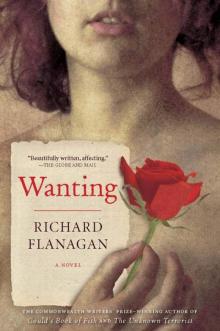 Wanting
Wanting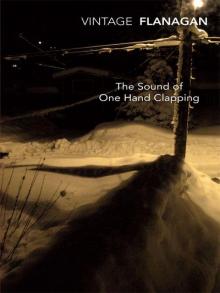 The Sound of One Hand Clapping
The Sound of One Hand Clapping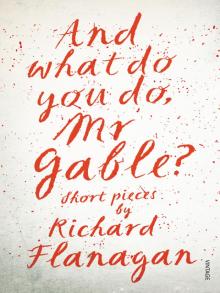 And What Do You Do Mr. Gable?
And What Do You Do Mr. Gable?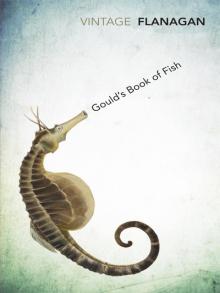 Gould's Book of Fish: A Novel in Twelve Fish
Gould's Book of Fish: A Novel in Twelve Fish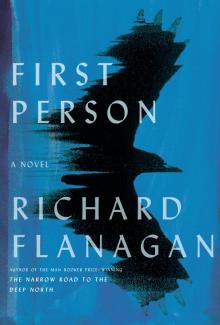 First Person
First Person The Unknown Terrorist
The Unknown Terrorist The Narrow Road to the Deep North
The Narrow Road to the Deep North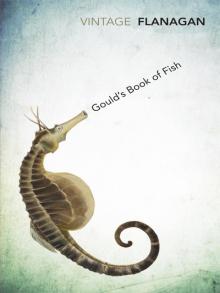 Gould's Book of Fish
Gould's Book of Fish